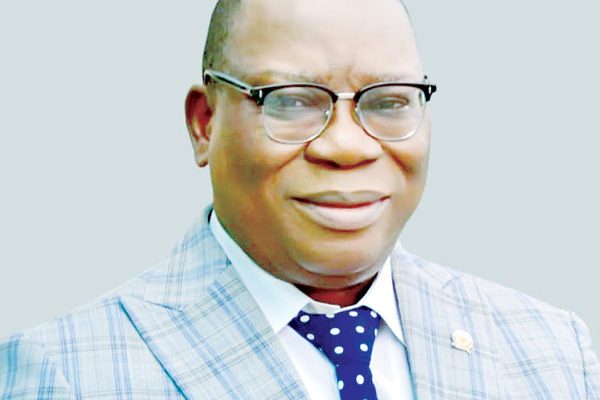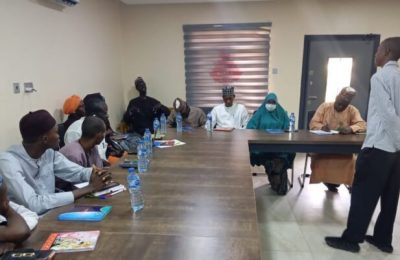Ajanaku Kolawole is a professor of Industrial Chemistry and a university administrator with over 28 years of experience in public and private university systems. In September, 2023, he was appointed the Vice Chancellor (VC) of Landmark University, a private university in Kwara State. In this interview by AYOMIPO AKANO, he speaks about his work as a VC, student loans, and other issues on the Nigerian university system.
Tell us about your work experience that landed you the vice chancellorship position.
I am a privileged person who has enjoyed the grace of God in this profession. I started my career at the Ladoke Akintola University of Technology (LAUTECH), Ogbomoso, in 1995, as a graduate assistant. After about 13 years in Ogbomoso, there was this drive to seek excellence and maintain integrity in public universities. There was always pressure from every angle in the university system, both from students and lecturers.

I said to God, what should I do? I went to my spiritual father, the late Bishop Afolabi — he was pastoring in Living Faith Church (LFC) Ilorin branch then. He afterwards told to me cross to Covenant University and concert my effort there. He encouraged me to transfer my service there. I put in my application and got interviewed by the late Professor Aize Obayan (the former Vice Chancellor of Covenant and Landmark). So, I came to Covenant University in 2007, as an active member of the church, the ministry, and the university. In September, this year, I was seconded to be the Vice Chancellor of Landmark University.
I’m married, and my wife is also a chemist. We were classmates. We got married after about six years of courtship. She is a PhD holder and teaches organic chemistry. We are blessed with three children.
Landmark University is a faith-based tertiary institution. What significant role does religion play in the scholarship and social lives of the students and staff?

The first core value in Landmark University is spirituality. Without the spirit of God, there is no society, no knowledge, no proper guidance. That’s part of the impact of Landmark University’s core values on our education platform. Before any lecture in Landmark — and the same in Covenant — you must start with a prayer.
In terms of social lives also, Landmark is sweet. At least, with the few times I have been here, I could see the students engage in various social activities with decency and fear of God. You can’t see them dress anyhow. These are some of the attributes that have helped Landmark to secure the academic and social lives of the students.
As Vice Chancellor, what principles guide your leadership style and decision-making process?
Actually, as a Vice Chancellor, I don’t make decisions by myself. I look at the university’s guiding policies. When I assumed office, I used my first month for reading the policies again. It’s not that I don’t know all these policies right from Covenant University — because we have the same operational policies — but when I came on board, I had to read the books again to get use to them so as to apply them. I always think from the perspective of the Chancellor before making any decision. I also have other people I work with in the university system — the Registrar and the Deputy Vice Chancellor. We deliberate on issues, and we take decisions, and at times, seek guidance from the Secretary, Board of Regents to take right steps.
Given the current economic hardship in the country, how do you run and sustain the university?
Landmark is God’s own university. Is it difficult for God, who created the world in seven days, to run just a single university? We want to appreciate the proprietor base of the university — the Chancellor and Chairman Board of Regents, Dr David O. Oyedepo and the Pro-Chancellor, Pastor Faith Oyedepo. When Covenant was about to start, the Chancellor travelled to some countries, read some books and came up with the policies for Covenant which is also applicable to us in Landmark. There is no way we will have those policies, follow them, and wouldn’t be able to run the university. You can’t embezzle money here, it’s not possible. Everything is seamless, with everyone taking responsibilities for his portfolios.
By God’s doing, we don’t owe salaries. The infrastructural development and all other things in the system are progressive. All glory and thanks to God and the support from the proprietor base. Finally, one of our core values is also sacrifice which has helped us in achieving the vision and the mission of the university.
It is in the news that the faculty and staff of the university have received a 20 per cent salary increase. How can the university sustain this increment without increasing school fees and putting financial burdens on the students and their parents?
Recently, the school approved a 20 per cent increase in salary. We appreciate the Chancellor and the Pro-Chancellor of the university for this consideration, and to the Board of Regents for implementing it, not only in Landmark but also in Covenant. The reason for the increment is to cushion the effect of the present economic state of the nation.
There cannot be any financial burdens on parents at all for this. It is good to note that the Chancellor has a funding organisation called the David Oyedepo Foundation (DOF) where eligible students are privilege to enjoy scholarship from the foundation.
In Landmark University, if you are running any agricultural programme, you can enjoy the DOF scholarship. The founding philosophy of Landmark is to be a world-class university, to spearhead an agrarian revolution, not only for the nation but for the African continent.
Why is it that the university does not allow undergraduate students to use smartphones on campus? Do you not think this would affect their communication with their family and friends, and also affect their social and academic lives?
Good question. Both in Landmark and Covenant universities, we don’t use smartphones or any sim-enabling devices.
Even at home, those smartphones and gadgets are distractions. Whenever a student is in school, the parent of such student bears the cost for his/her ward to be taught and not to be in school to play. In a nutshell, it’s just a distraction.
To communicate with their parents while in school, we have various platforms to get in touch with their parents. They have emails. There is internet both at the lecture halls and halls of residences. There are phone booths and call cards.
The university has a rich Christian history and tradition. How do you balance these traditions while adapting to contemporary social and secular changes in university management?
In university management, students are admitted from all over the world and from different backgrounds, with different ideas. That is why we have rules. An institution must have a focus and a goal, and anybody who comes to such institution must be ready to comply with the goals of that institution. That is how we balance and adapt all our students in the university by our royal laws.
Coming up with your ideas is good — we would allow you within the same system to flourish with your idea. That is why innovative hubs are created in Landmark to enable the development of the students’ skills and ideas which forms a platform to start their own businesses while they are still in school under the tutelage of experts.
The university has churned out many sets of graduates. How satisfied are you with the feedback you get on the performance of your products out there?
We have quite a number of our graduates out there. If I say I’m 100 per cent satisfied with our products, it means I don’t like growth. I can appraise that at least that I’m about 70 — 75 per cent satisfied about the feedback we are receiving from our products. They have been very good — most of them have their own companies because they started those initiatives when they were in school and we supported and helped them to grow. They were trained to be employers of labour, and not to be looking for jobs. That’s the entrepreneurial aspect of the university, which has helped them to develop.
There are quite a few of them that are in the diaspora, that even give back to the university in their various fields. They teach our students online — we call it International Volunteers Visiting Scholars (IVVS). It’s not that we are 100 per cent okay with our products, same with our current students. However, they will get better, do well, and be able to harvest their successes in the future.
What major innovations, in terms of research, inventions, and technology, could the university boast of?
I’m not new in Landmark, I’m just new as the Vice Chancellor. I’ve always been in contact with the university when I was in Covenant. There are some achievements that Landmark has attained. A few of them were displayed at the just concluded 10th convocation ceremony. I give kudos to the past headship, the past vice chancellors, who put in their best.
In engineering, we have some products to showcase. In Landmark University Center for Research and Innovation Discovery (LUCRID), there are some showcased projects that have been done. The agrarian drive of the institution has also produced some things. We have cows used for research, for the mutation of their genes to breed special types of cows. It’s one of our faculties that is championing this. We are now looking ahead towards the 2030 agenda that is just unveiled by the Chancellor and has to do with products development.
We’re not resting on our oars. We can’t get to perfection at a go, but can achieve perfection by moving a step after the other.
Recently, McPherson University’s Vice Chancellor said 95 per cent of private universities are better equipped than most public universities. Is that the case in Landmark? Could you share your thoughts on this?
I think I’m aware when the McPherson University’s vice chancellor mentioned that. I read it in the news. When it comes to research — It’s not that the Federal Government is not doing their best — but when you take a look at private universities, they have a goal/vision that drives them and this makes them to channel most of their resources to be able to achieve the goal. So, most of the research facilities are developed, especially in private universities that have to promote research and teaching. Some attributes of private universities are adopted by many federal universities at times. For instance, the dress code was taken from private universities, entrepreneurship was taken from private universities (Covenant and Landmark universities). Some of those initiatives were adopted for the university system by the National University Commission (NUC).
The government does not fund private universities. Private universities are not entitled to certain government funds. So, the little fund private universities have, they won’t want anybody to squander it. They use it judiciously. This affirms what the Vice Chancellor of McPherson mentioned in his speech.
The federal government’s student loan scheme for tertiary institution students will commence early next year. How do you feel that private university students were excluded from the scheme?
I’m not happy about this. The same students, whether private or public, will be in the same society, looking for the same employment, and the Federal Government says it’s going to support a few students while private university students are not allowed to benefit from it. Are private university students not part of Nigerian students? Are they not part of the system? So why are we discriminating? This is not what is in operation in some foreign countries.
We also have TETFUND. Private universities are not enjoying TETFUND grants — it is only meant for public universities. This is discrimination, and it is not helping the Nigeria educational system. The government should be for all, not for a few. They believe that those who send their wards to private universities are rich, but many parents are paying through their noses to educate their children in private universities.
I don’t understand the rationality why the loans will be for students in public universities while others in private universities are not entitled them. The government should look into it again. It’s not encouraging.
In what ways do you want President Bola Tinubu’s administration to support private universities in the country?
Tinubu has his agenda, and he should pursue it. They are politicians. However, one thing I know is that education is much more important to the development of any nation. This ‘Japa’ syndrome would not have been if our education system had been better.
The basic amenities should be provided for everyone — electricity, security, good roads and water. We are not asking for the internet or jobs. Give us those four basic things. If these things are in place, an average graduate will be able to start up his own business. He would not think of looking for employment. With my experience with Landmark students, I have seen ideas thriving in them and that they are ready to be groomed. But if these infrastructures are not there, it will be difficult for them to achieve much. The basic needs must be there. That’s what I’ll advise the president on.
What kind of future do you envision for the university in five years, and what are your plans for achieving them?
I could see Landmark University at the forefront in the next five years. In the university ranking system, Landmark is already ranked globally. A twelve-year-old university already ranked globally. So, in the next five years, I could see the limelight of Landmark in every facet — student development, our students funding their businesses themselves, creating jobs themselves. I could see the university at the forefront of research. I monitor our research platform every week and I could see us also growing in that area.
To achieve this, we must come together and collaborate as a team. It is research that helps the teaching. We shouldn’t be teaching old-school stuff. We should come up with new, applicable ones to solve the context of the new generation issues and this must also be operational.
What are the major challenges you face as vice chancellor, and how are you able to navigate them?
People, people, people; that’s what my Chancellor will always say. I can work with robots and machines, but working with people is a great issue and we also need the same people to also achieve our goals. Some people will not just want to work with you, and you must make them to perform their duties. That’s why we have portfolios. If you have a particular role as a lecturer, this is what you must do, this is how you must go about it, and it must be delivered at the appropriate time.
So, people are the major challenge, including students. For instance, “Go and do your registration,” students wouldn’t listen until you put some measures in place before they can do the needful.
In all of these, as an administrator, you must not be a boss, you must be a worker yourself and set good examples. Always act what you say because that is what will make your instructions to be followed. You must be at the forefront of all assignments and be responsible. If you want to succeed in any administrative office, you have to be at the forefront, doing the right thing, and people will follow you. That is the way to navigate through challenges in leadership.
READ ALSO FROM NIGERIAN TRIBUNE







